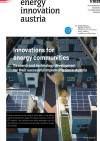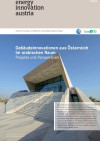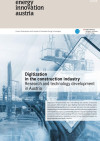Suchergebnisse
Innovations for energy communities

Research and technology development for their successful implementation in Austria
energy innovation austria
1/2023
Herausgeber: BMK in cooperation with the Climate and Energy Fund
Englisch, 12 Seiten
Downloads zur Publikation
1. Ausschreibung "Stadt der Zukunft" - Ergebnisse der Jurierung
Die Ausschreibung war von 25. September 2013 bis 30. Jänner 2014 geöffnet. Die Ergebnisse der Jurierung liegen nun vor, hier finden Sie eine Liste der zur Förderung vorgeschlagenen Projekte.
Start der Public Consultation „Dialog Energiezukunft 2050“
Unter Beteiligung von zahlreichen Expertinnen und Experten aus Forschung, Wirtschaft und Verwaltung sowie der fachlich interessierten Öffentlichkeit wird, aufbauend auf der 2010 vom Rat für Forschung und Technologieentwicklung publizierten Energieforschungsstrategie eine aktualisierte und mehrjährige Strategie für die künftige Forschungs- und Technologiepolitik Österreichs erarbeitet.
Gebäudeinnovationen aus Österreich im arabischen Raum

Projekte und Perspektiven
energy innovation austria
3/2014
Herausgeber: BMVIT und Klima- und Energiefonds
Deutsch, 8 Seiten
Downloads zur Publikation
Ausgabe 4/2016 der Publikationsreihe "energy innovation austria"
Die aktuelle Ausgabe beschäftigt sich mit dem Thema Innovationen für die Stadt der Zukunft.
scaleFLEX - Scalable method for optimizing the energy flexibility of districts
Development of a decentrally organized automation method for improving the demand-side flexibility options of buildings and districts. The utilized data-driven algorithm promise high scalability and therefore low installation and operating costs. The developed method will be validated using different building types (high-tech office buildings, low-tech office buildings, residential buildings).
Innovative Energie- und Gebäude-Lösungen für den arabischen Raum
Beim "Stadt der Zukunft"-Themenworkshop am 24. Mai in der WKO in Wien zeigen österreichische Unternehmen innovative Energie- und Gebäudelösungen, die sie im arabischen Raum geplant und umgesetzt haben.
Sondierung für die Entwicklung von moosbewachsenen Gebäudefassadenpaneelen (BE-MO-FA)
Sondierung für die Entwicklung von moosbewachsenen Fassadenpaneelen durch Auswahl und Erprobung von geeigneten Moosarten, neuen Feuchtespeicher- und Haftsubstraten, Materialien für Tragpaneele und hochbautechnischen Konstruktionsdetails Für ganzjährig grüne, dauerhafte, pflegeextensive und kostengünstige Gebäudefassaden.
Abschlussveranstaltung des Projektes "Eco.District.Heat. Potenziale und Restriktionen leitungsgebundener Wärmeversorgung in Stadtquartieren"
27. Juni 2018, 14:00 – 18:00 Uhr
Universität für Bodenkultur Wien, Wilhelm-Exner-Haus, 2. OG, EH05, Peter-Jordan-Straße 82, 1190 Wien
Das Forschungsprojekt Eco.District.Heat setzt sich mit dem Themenbereich "leitungsgebundene Wärmeversorgung" in österreichischen Städten auseinander.
Digitization in the construction industry

Research and technology development in Austria
energy innovation austria
4/2018
Herausgeber: BMVIT und Klima- und Energiefonds
Englisch, 8 Seiten
Downloads zur Publikation
E_PROFIL - neighborhood profiles for optimized energy transformation processes
E_PROFIL is a set of methods (an IT-supported toolkit) for the elaboration of neighbourhood profiles. The aim of the project is to facilitate an energy and resource efficient development in the planning practice of Austrian cities. Furthermore, the project is an important asset for research and planning activities in Europe and can also be applied to other neighbourhoods.
MuT - Monitoring of urban Technologies: Classification, Specification, Evaluation
In the frame of the project a classification system for Smart City Technologies had beed developed, the relevance of a wide range of technologies in terms of their potential contribution to the development of sustainable and more resilient cities with a high quality of life had beed evaluated and a comprehensive classification of the technical maturity of relevant technologies, technical (sub-)systems and technology-related services had been given.
CiQuSo - City Quarters with optimised solar hybrid heating and cooling systems
The project CiQuSo aimed to develop, evaluate and optimize concepts for solar energy systems to provide energy for buildings and cities. The applicability of the developed methods and concepts were shown as an example at Itzling, a part of Salzburg city.
PEAR - Prüfstand für energieeffiziente Automation und Regelung von Gebäuden
Der mit dem Planungsstand errechnete Energiebedarf deckt sich oft nicht mit den gemessenen Werten des Betriebs. In diesem Projekt werden Automation und Regelung auf den Prüfstand gestellt und eine Lösung zur Bewertung der Energieeffizienz von Regelstrategien in den Bereichen Raumlufttechnik, Betonkernaktivierung und Free Cooling entwickelt, welche anhand des Bauprojekts „Post am Rochus“ validiert wird.
FFF-TaliSys - Freiformflächen-Tageslichtsysteme für Fassaden und Oberlichter
Im Rahmen von FFF-TaliSys wurden neuartige Tageslichtsysteme auf Basis der Freiformflächentechnologie erarbeitet und bis zu Funktionsmustern weiterentwickelt. Innovative Systeme sollen die widersprüchlichen Anforderungen an Tageslichtsysteme bestmöglich lösen.
P2H-Pot: Potentiale, Wirtschaftlichkeit und Systemlösungen für Power-to-Heat
In P2H-Pot wurden die wettbewerbsfähigen Potentiale für Power-to-Heat (P2H) im urbanen Raum bestimmt. Mittels thermodynamischer Simulationen wurde die Eignung verschiedener technischer P2H Systemkonfigurationen untersucht und die Ergebnisse wurden mit Praxiserfahrungen aus Skandinavien kombiniert. Basierend auf einer Simulation des Strom- und Wärmemarktes in Deutschland und Österreich wurde die kurz, mittel- und langfristige Relevanz und Wirtschaftlichkeit von P2H analysiert. Gemeinsam mit einem Fernwärmeunternehmen wurden drei Fallstudien durchgeführt.
Webinar: ICP Europe Training für Projektentwickler im Bereich Gebäudesanierung
12. Oktober 2016, 14.00 - 17.00 Uhr
Online
Im dreistündigen, kostenlosen „Investor Ready Energy Efficiency“ Training für Projektentwickler erfahren Sie wie Sie die kostenlosen ICP Europe Tools einsetzen können, um bei Gebäudeeigentümern und Investoren das Vertrauen in die technische Projektentwicklung und die finanziellen Erträge zu erhöhen.
Indicators for urban areas – for construction, operation and mobility in climate-friendly areas
Development and coordination of indicators for energy and ecological evaluations of urban areas based on the Swiss 2000-Watt certification system. The results will be used for the development of a quality assurance system for urban areas similar to the klimaaktiv declaration for buildings and the e5 certification for communities.
3D*3B - 3D-Betondruck und Bewehrung für emissionsarme biegebeanspruchte Tragstrukturen des Hochbaus
Interdisziplinäres Projekt zur Integration von 3D-Betondruckelementen in vorwiegend biegebeanspruchte Tragstrukturen mit dem Ziel der nachweisbaren Reduktion von klimarelevanten Emissionen im Baubereich. Die Ergebnisse dienen der umfassenden Beurteilung technischer, logistischer und klimarelevanter Aspekte.
solSPONGEhigh - Hohe solare Deckungsgrade durch thermisch aktivierte Bauteile im urbanen Umfeld
Im Forschungsprojekt solSPONGEhigh wurde die intensive Nutzung von thermisch aktivierten Bauteilen (TABs) als zusätzlicher thermischer Speicher in verschiedenen Gebäuden unter vorrangigem Einsatz von Solartechnologien (Solarthermie bzw. Photovoltaik) untersucht. Die Arbeitshypothese ging davon aus, dass durch die Aktivierung und Nutzung der bauteilimmanenten thermischen Speicher eine Deckung des Gebäudeenergiebedarfs mit Solartechnologien von bis zu 100 % erreicht werden könnte.
